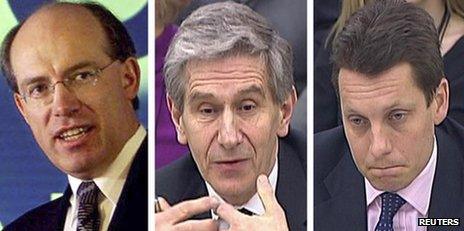Why bash the HBOS three?
- Published
- comments

Sir James Crosby and Andy Hornby, with Lord Stevenson (centre)
It is perhaps a bit odd that lords and MPs on the banking standards commission have chosen to chastise and publicly humiliate two former chief executives of HBOS and the erstwhile chairman - and to ask the regulator whether the three of them should be banned from working in the City.
To be clear, it is not the fact of censure that is odd. It is the timing, and that it's just these three rather than the great gang of bosses of failed British banks.
One relevant point is that the colossal losses generated by HBOS from its reckless lending have been public knowledge for four years.
It is true that the commission has tried to supply a bit more granular detail on the hideous red ink spilled by this owner of Halifax and Bank of Scotland.
It estimates that HBOS's aggregate pre-tax losses between 2008 and 2011 - for most of which it was owned by Lloyds - totalled £30bn, as a result of impairments on loans and investments of a staggering £50bn.
And it calculates that on a proportionate basis, HBOS's losses on loans were twice that even of Royal Bank of Scotland.
As I understand it, the accused former HBOS directors - Sir James Crosby, Andy Hornby and Lord Stevenson - feel these numbers may be an over-statement.
That said, the chairman of the commission, Andrew Tyrie, told me that all these calculations had been passed to the Financial Services Authority, which - he says - indicated they were in the right ballpark.
Also, Messrs Crosby, Hornby and Stevenson would presumably not dispute that HBOS would have gone bust had it not received a massive bailout from the taxpayer and been merged with Lloyds.
And although they are not commenting in public, the scale of the losses generated in two of HBOS's divisions, corporate and international, represent a special kind of incompetence - or at least that charge from the MPs and lords is the hardest for the accused HBOS troika to bat away.
In international, HBOS's Irish and Australian banks were particularly duff, and the bank's strategy of trying to become a leading player in Ireland and Australia looks especially ill-advised. The commission estimates that losses on Irish loans between 2008-11 were £10.9bn, representing a write-off of more than a third of the value of Irish loans. The Australian write-offs were 28% of loans, or £3.6bn.
And in corporate, HBOS was what the Americans would call the "go to bank" for property and high risk companies wanting to load up on debt. The commission estimates loan impairments in this division were £25bn between 2008-11, rather more than the total GDP of Cyprus.
This was not harmless and victimless incompetence, some would say, but a tragedy for the British people and economy.
HBOS, created by the merger of Halifax and Bank of Scotland in 2001, hoped to become a powerful new competitive force in British banking, offering superior prices and services to households and businesses.
But its collapse and rescue by Lloyds actually led to greater concentration in the banking market, and was therefore anti-competitive - and the wounded Lloyds has been struggling to provide the credit needed for British economic recovery.
That said, a large degree of what went wrong at HBOS was - to coin the phrase - systemic. This was a global banking crisis, and banks all over the world with big exposure to property - banks in Ireland, Spain, the US and elsewhere - incurred life-threatening losses.
But not all banks and lenders had to be propped up by taxpayers. In the UK, for example, Nationwide and HSBC weathered the storm, because their foundations were stronger.
Probably the single biggest error at HBOS, exposed by standards commission, was that those who tried to control risk-taking at the centre of the bank did not have the mandate or power to rein in over-exuberant divisional bosses.
All that said, there is a potential danger in this attempt by parliamentarians at ritual blood-letting so many years after the great crash of 2007-8.
Had the punishments been meted out in 2009 or so, there might have been a great national sense of justice having been done. And then morale in the banking industry - not unimportant to our prosperity - could have been rebuilt.
Here's the thing: if the HBOS troika are to be blacklisted from the City, why not ban those who ran the other failed banks, RBS, Bradford & Bingley and Northern Rock?
And if a new season of banker-bashing has been opened, is that the important catharsis that will allow reconciliation between people and banks, or an economically damaging postponement of the rehabilitation of this vital industry?